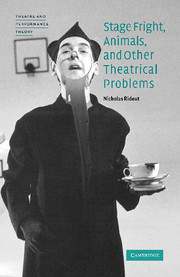Afterword
Published online by Cambridge University Press: 04 December 2009
Summary
So there you are, then. And there they are, too, now. The machinery of representation has been switched off. The lights in the house have come up. You applaud and they acknowledge your applause. That's how it is. At last, we meet face to face, all the pretending has come to an end and we know who everyone is and where we are. We can forget about ‘ontological queasiness’ until the next time. We have just these closing responsibilities to discharge and we can all be on our way. If we happen to bump into one another on the train home we can do so as strangers, can we not?
At the end of one of the performances of Raffaello Sanzio's Giulio Cesare in London in 1999 the lights come back up on an uncertain situation. The audience is scattered. It does not add up to a collective presence. It is clearly divided, and cannot properly be spoken of as a single entity. Yet it has a collective responsibility to discharge. The actors stand together near the centre of the stage. They do not form a line across the stage. This is the first time all of them have appeared together, because the second half of the production is performed mainly by two women who did not appear in the first, accompanied, briefly, by only four of the six others who appeared in the first half. They appear most unlikely as a company.
- Type
- Chapter
- Information
- Stage Fright, Animals, and Other Theatrical Problems , pp. 161 - 168Publisher: Cambridge University PressPrint publication year: 2006



